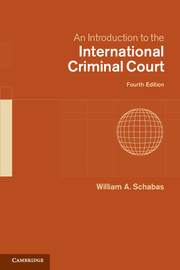Book contents
- Frontmatter
- Contents
- Preface
- List of abbreviations
- 1 Creation of the Court
- 2 The Court becomes operational
- 3 Jurisdiction
- 4 Triggering the jurisdiction
- 5 Admissibility
- 6 General principles of criminal law
- 7 Investigation and pre-trial procedure
- 8 Trial and appeal
- 9 Punishment
- 10 Victims of crimes and their concerns
- 11 Structure and administration of the Court
- Appendices
- Bibliography
- Index
- References
3 - Jurisdiction
- Frontmatter
- Contents
- Preface
- List of abbreviations
- 1 Creation of the Court
- 2 The Court becomes operational
- 3 Jurisdiction
- 4 Triggering the jurisdiction
- 5 Admissibility
- 6 General principles of criminal law
- 7 Investigation and pre-trial procedure
- 8 Trial and appeal
- 9 Punishment
- 10 Victims of crimes and their concerns
- 11 Structure and administration of the Court
- Appendices
- Bibliography
- Index
- References
Summary
The term ‘jurisdiction’ is used in several places in the Rome Statute to identify the scope of the Court's authority. Article 5 is entitled ‘Crimes within the jurisdiction of the Court’, and provides a list of punishable offences. Article 11 indulges the lawyer's fetish for Latin expressions. It is labelled ‘Jurisdiction ratione temporis’, although the plain English ‘temporal jurisdiction’ would have done just as well. Article 12 is entitled ‘Preconditions to the exercise of jurisdiction’, but it actually sets out what are described as ‘territorial jurisdiction’ and ‘personal jurisdiction’. Article 19 requires the Court to ‘satisfy itself that it has jurisdiction in any case brought before it’. Pre-Trial Chamber I did this quite explicitly when it authorized the issuance of the arrest warrant against Thomas Lubanga. The concept of jurisdiction also arises with regard to national justice systems. Article 17 requires the Court to defer to national prosecutions, unless the ‘State which has jurisdiction’ over the offence in question is unwilling or unable genuinely to investigate and prosecute. In the same context, Article 18 speaks of the State that ‘would normally exercise jurisdiction over the crimes concerned’.
States exercise jurisdiction in the field of criminal law on five bases: territory, protection, nationality of offender (active personality), nationality of victim (passive personality), and universality. Territory is the most common, if for no other reason than that it is the only form of jurisdiction where the State can be reasonably sure of actually executing the process of its courts.
- Type
- Chapter
- Information
- An Introduction to the International Criminal Court , pp. 62 - 156Publisher: Cambridge University PressPrint publication year: 2011



